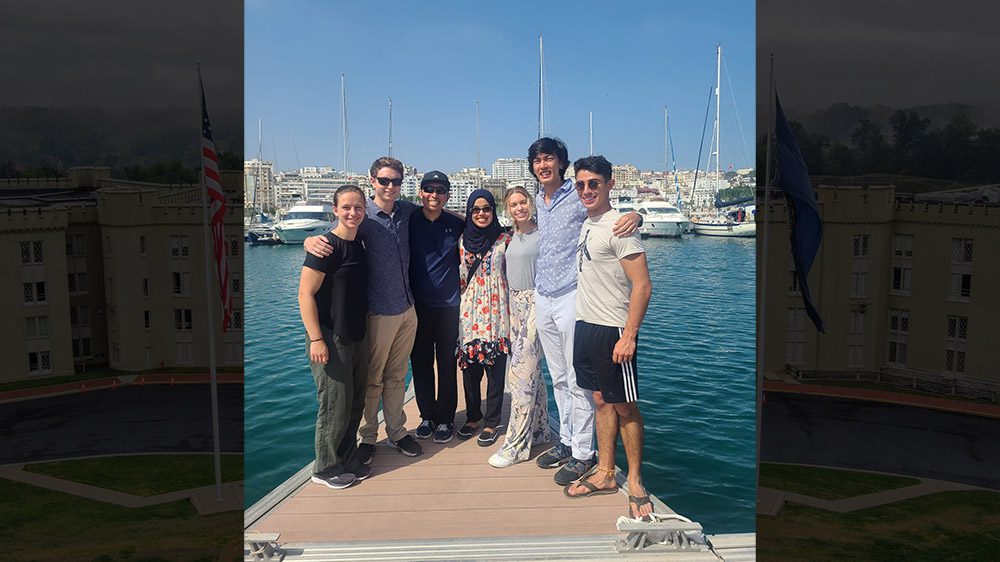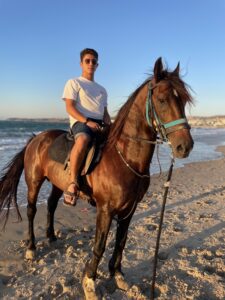VMI Cadet Awarded Scholarship to Study in Morocco

Cadet Antonio Ahanj ’24 and fellow participants in the Critical Language Scholarship program visit the port of Tangier in Morocco.—Photo courtesy Ahanj.

Cadet Antonio Ahanj ’24 and fellow participants in the Critical Language Scholarship program visit the port of Tangier in Morocco.—Photo courtesy Ahanj.
Cadet Antonio Ahanj ’24, an international studies major, spent the summer studying Arabic in Tangier, Morocco, after winning a highly competitive scholarship. The program, the Critical Language Scholarship, is funded by the U. S. State Department and is open to all civilians. The goal of the program is to broaden the base of Americans studying and mastering critical languages and to build relationships between the people of the United States and other countries. CLS provides study opportunities to a diverse range of students from across the United States at every level of language learning.
Ahanj, the first VMI cadet accepted into the program, underwent several rounds of vigorous interviews and screenings when he applied for the scholarship. In addition to grades, transcripts, and recommendations, applicants were judged on how they responded to four short essay questions, each not exceeding 300 words. “I love to write and talk, so compressing my passionate responses and thoughts to complicated questions into the word limit was extremely challenging,” stated Ahanj.
Maj. Jason Schroepfer, assistant professor of modern languages and cultures, assisted Ahanj in the application process for the scholarship. “I am so proud of Tony’s talent, positive attitude, and hard work. These traits helped him earn this coveted scholarship,” said Schroepfer.

Cadet Antonio Ahanj ’24 rides a horse on the beach of Tangier, Morocco.—Photo courtesy Ahanj.
The group of scholars with whom Ahanj studied in Morocco included many pursuing advanced degrees from Ivy League universities, and a 2022 graduate of Washington and Lee University. He was one of only five undergraduate students. Classes lasted four hours each day; each day’s classroom study was comprised of two hours of grammar, one hour of conversation over a wide variety of topics, and then one hour of Derija, the dialect of Arabic spoken in Morocco. In addition to classroom learning, each member was assigned a language partner, a Moroccan student who spent at least three hours per week tutoring them and teaching them about Moroccan culture.
A particular cultural experience that stood out for Ahanj was the celebration of Eid al-Adha, a Muslim holiday that commemorates the Quranic story of Abraham sacrificing a sheep instead of his son, Ishmael. Ahanj celebrated the holiday at the home of his language partner and his family. “Despite me not being Muslim, I was invited to come along to morning prayer at the masjid (mosque) and to experience the holiday in its entirety, which included sacrificing a sheep, cooking, and eating it,” explained Ahanj.
After morning prayer, the group went to the host’s home and ate breakfast together. They then went up to the roof of the house to sacrifice the sheep. “I helped skin, clean, and dress the sheep. I grew up in an American middle-class household, so this experience was totally new and mind-blowing to me. Without question, this was one of the most extraordinary experiences of my life,” stated Ahanj.
A challenge Ahanj enjoys when learning a new language is being placed in situations where he is woefully ill-equipped but must persevere. One such situation was when he was on the beach of Tangier, where men walk around with horses and camels and offer 30-minute rides for 50 dirhams ($5). Despite having never ridden a horse, Ahanj paid the man and climbed on the horse. Though his Arabic and Spanish vocabularies are extensive, he knew no terms about horseback riding, and the owner of the horse knew no English. “The horse was magnificent, but the directions the man gave me for making the horse move and stop were in the form of hand gestures. As a result, I did what I had seen Clint Eastwood do in the spaghetti Western movies. I kicked the side of the horse, held on for dear life, and shot off into the Moroccan sunset,” quipped Ahanj.
According to Ahanj, the people in Morocco are friendly, generous, and eager to share their culture and heritage with those who wish to learn. “Interacting with Moroccans daily and learning about their lives and experiences has been an extraordinary honor. It’s one thing to learn about Middle Eastern culture; it’s quite another to experience and live it,” mused Ahanj.
Ahanj will spend the fall semester in Spain to pursue a higher level of language proficiency. His goal is to graduate from VMI with proficiency in three foreign languages: Arabic, Farsi, and Spanish. “My father is a native speaker of Farsi. Though I had ample opportunities to learn foreign languages growing up, I didn’t truly see the importance of knowing them until my rat year. Since then, I’ve been playing catch-up to learn them,” he said.
Ahanj is from Nolensville, Tennessee, where he attended Nolensville High School. He is the son of Laura and Mahmoud Ahanj. Upon graduating from VMI, he hopes to work for the U.S. State Department in the foreign service office.